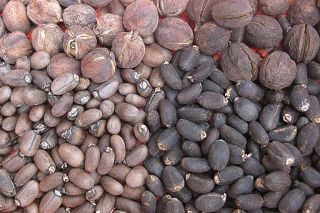From Guest Blogger Jordan: Biofuels Can Provide the Same Amount of Energy as Crude Oil

However, there is a chance that the main drawbacks of biofuels – relatively poor quality and low energy content – will be eliminated soon, since there is a new technology that is being developed in the Netherlands, that could help improve the quality of biofuels and increase energy content per liter. Researchers at the University of Twente in the Netherlands have developed a new catalyst that can reduce acid levels and water content in biofuels, which have been their main weaknesses so far.
Researchers have created a catalyst out of sodium carbonate on an aluminum sheet, which is applied to the oil generated from biomass, while it is being heated in nitrogen at 500 degrees Celsius. By increasing the temperature the oil is heated at, and by adding a sodium carbonate catalyst, researchers say that the energy content of the oil can be raised from 20 to 33-37 million joules per kilogram. This is a significant increase that can make biofuels nearly as quality as diesel fuel, which has extremely high energy per liter content. What’s more, researchers say that they can improve biofuel even further, by adding cesium – an alkali metal – in the catalysation process, to reduce the toxic smell that is released when the oil is burned.
“By doing so, we can, for instance, also reduce the aromatics, which are harmful when inhaled,” said Prof. Kulathuiyer Seshan, one of the scientists leading this research project.
On top of having higher energy content, the oil that is generated through this method has another advantage over previous-generation biofuel, as it doesn’t contribute to a potential food crisis, that could be created through an increased use of food crops for making ethanol, one of the most common biofuels in the world. Unlike conventional methods for production of biofuels, that use corn, sugar cane, or wheat, researchers at the University of Twente are using waste vegetation. This means that there is no competition between crops that biofuels are derived from and food crops, which has also been one of the reasons why biofuels have not become mainstream yet.
This technology is being tested by KIOR, a renewable fuels company based in Texas, that is using the sodium carbonate catalyst to produce 4,500 barrels of oil per day. In addition to the University of Twente, the same technology is being further developed at the University of Groningen and Utrecht University, as part of the CATCHBIO programme of the Netherlands Organization for Scientific Research.

Bio fuels are the best renewable resource and the best replacement for fossil fuels like coal, diesel, natural gas etc… These bio fuel also known as “white coal” are manufacturing from briquette machine plant is an easy and convenient way to produce them by and eco-friendly technique.
The food vs fuel debate was long been debunked. The price of field corn has dropped by more than 50% since the highs, but food prices haven’t moved. Why? High prices of diesel fuel have maximum influence on food costs. Ethanol lessens the demand and dampens the price spikes of crude oil cost and in doing so, has a net positive impact on food costs. Farmer incomes have increased per ethanol. This new revenue stream invigorates farming practices, investments in new equipment and so on down the line. If farms industry is doing well, food production does well. This phenomena is international with some of the poorest nations suddenly investing in farming. Quality of ethanol is extremely pure as compared to commercial gasoline. Ethanol additives improve the quality of gasoline per emissions, torque, cost, and efficiency of operation. The additive has natural detergent capability so often a trouble spot with gasoline. The additive replace the most carcinogenic component of gas that is added in attempt to raise octane. Ethanol very potent upon this talent and much cheaper and healthier. The ethanol additive has water absorption ability that cleans up problem fuel. Remember the water mess before ethanol? How did we keep our cars running, yes, with cans of alcohol to remove water. Auto technology can exploit the fuel improvements per high octane ethanol. The ethanol achieves making gasoline more efficient. As I’m told E30 about a perfect fuel for the current state of engine technology that maximizes efficiency to the point of either decreasing or increasing ethanol content would decrease mileage. These cars are not built yet per the need to operate with plain gasoline, but if fuel supply could produce this super premium fuel, automotive claim they will.